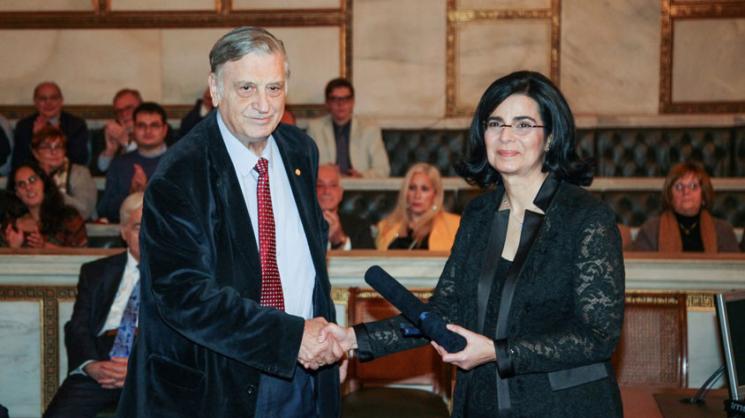Lydia Kavraki, the Noah Harding Professor of Computer Science, professor of bioengineering, electrical and computer engineering, and mechanical engineering at Rice University, has been elected as a Corresponding Member of the Academy of Athens, the premier scientific society in Greece and the world’s oldest academy.
She was inducted on December 11, 2018 at a ceremony at the Academy of Athens’ Hall in Athens, Greece.
Established in 1926, the Academy of Athens is considered the modern continuation of the ancient Academy of Plato. In accordance with its founding charter, the Academy promotes “the cultivation and advancement of the Sciences, Humanities and Fine Arts.” Membership is the most prestigious recognition that an eminent representative of the scientific, intellectual and artistic cycles can attain in Greece.
Kavraki was recognized for her contributions in robotics and biomedical informatics. She has been a leader in the development of motion planning algorithms that enabled, for the first time, the efficient computation of paths for robots with articulated manipulators. Her work set the standard for motion planning research and created a paradigm shift in the way motion is computed in robotics. With colleagues at Rice she is now working on task and motion planning in the context of collaborative robotics enabling robots to work with people and in support of people.
Her team is also working with the NASA Johnson Space in Houston to augment the capabilities of robots for space missions. By drawing an analogy between articulated robots and proteins, Kavraki developed robotics-inspired methodologies for computational structural biology and translational bioinformatics. Her research now targets the modeling of proteins and biomolecular interactions impacting the development of new therapeutics.
She also collaborates with researchers at the MD Anderson Cancer Center and the Baylor College of Medicine. Kavraki leads one of the fourteen nationwide training grants of the National Library of Medicine under the auspices of the Gulf Coast Consortia where she also serves as the chair of the Keck Executive Committee.
Kavraki is a Fellow of the Association for Computing Machinery (ACM), a Fellow of the Institute of Electrical and Electronics Engineers (IEEE), a Fellow of the American Association for the Advancement of Science (AAAS), a Fellow of the Association for the Advancement of Artificial Intelligence (AAAI), and a Fellow of the American Institute for Medical and Biological Engineering (AIMBE). In 2000 Kavraki received the ACM Grace Murray Hopper Award, while in 2018 the same society presented her with the ACM Athena Lecturer Award. She has been recognized with BioHouston’s Women in Science Award and the Anita Borg ABIE Technical Leadership Award.
Kavraki received the Charles Duncan Award for Excellence in Research and Teaching from Rice University and the Presidential Mentoring Award again from Rice University. Kavraki is a member of the Academy of Medicine, Engineering and Science of Texas (TAMEST) and a member of the National Academy of Medicine (NAM).
Kavraki’s induction took place in the Academy of Athens' Building. Designed in 1859 by the Danish architect Theophil Hansen, is regarded by some experts as the most beautiful neoclassic building worldwide. The pictorial ensemble decorating the Academy's Main Hall was completed in 1880 by the Austrian artist Christian Griepenkerl.
This ensemble begins thematically with Aeschylos' Promitheas Desmotis and depicts successive phases in the myth of Promitheas who stole Fire from the ancient Greek Gods with the help of the Goddess Athena. Over the ages, Promitheas has become the symbol of knowledge and intelligence and a champion of the human race.
Rice Engineering

